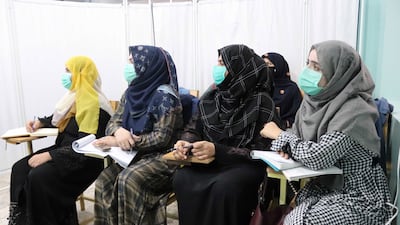The story of Akbar, a student of mine at a private university in Kabul, epitomises young Afghans’ defiance of the odds when it comes to their education. He used to be a part-time farmer. He eventually found a job as a government employee to pay for an undergraduate education. Now, he is one semester short of completing a postgraduate degree in international relations. But he is also unemployed, and can barely afford to take part in the classes he is attending online.
He is in a holding pattern. Students have to pay their school fees before taking exams, but most cannot afford to do so. Rather than carrying out any new instruction, which costs more money, his university is conducting revision classes to bide the time until the situation improves and exams can be held. Even if students have enough money saved to pay the upcoming fees, in order for them to do so, Afghanistan’s banking system must resume. If that takes too long, many students will lose any momentum they have left.
If young people like Akbar are made to give up when they’re so close, Afghanistan will have very little hope of a sustainable future.
Universities in Afghanistan are faced with unprecedented challenges. Some have laid off more than 50 per cent of their administration staff. Less than a quarter of students are attending classes. Most lecturers and students are currently in camps trying to find their way to a better and safer life. They cannot be blamed for trying to escape the persecution that faces many of them despite the general amnesty promised by the Taliban.
The students who remain have no access to their savings, as the banks are out of cash and customers have to wait an average of six hours in order to withdraw only $200 a week. Most students who were employed by the government, international organisations or foreign embassies have lost those jobs. Keeping such circumstances in mind, it is crucial that those now in charge address these issues before it is too late.
The Taliban leadership seem to be too consumed by their efforts to consolidate power and restructure their organisation to adjust to its new role of governance. The caretaker cabinet announced seems to be under-qualified to address the major issues facing the country. Though the difficult task of accommodating students’ circumstances in the current turmoil should have been managed by the Afghan Ministry of Education, they seem to be busy reforming universities to align with their cultural code. In the absence of active government policies, Afghan and international academia will have to step up and manage the crisis.

The economic limitations, brain drain and bleak hopes for the future call for innovative solutions. There are two measures that the Afghan and international academic community can take. First, to address the financial crisis, universities should readjust tuition fees to accommodate students who still have jobs and can afford to pay for their education, but are stretched thin.
University lecturers, of which I am one, can also volunteer for a pay cut to enable universities to sustain themselves. The international community could also offer scholarship programmes for students within Afghanistan to continue their education abroad.
Second, to address the absence of academics in the country, universities have to work towards reabsorbing faculty who have sought asylum abroad to continue to teach students through online channels. The international community could help pay the salaries of these lecturers to sustain their livelihoods and give them a sense of purpose, but also to ensure that their knowledge remains available to students within Afghanistan.
The goal has to be to keep the ball rolling.
Realising any of this requires cohesion among efforts inside and outside Afghanistan. One way to facilitate this would be for a universally credible intergovernmental body focused on education, such as Unesco, to lead the way. The platform to generate funding as well as planning for the higher education sector of Afghanistan needs, at this particular moment, to be internationalised.
The international community may have reservations in dealing directly with the Taliban. But there are plenty of avenues through which they can establish channels to communicate and coordinate efforts directly with Afghan universities. The most important thing is to get funds to these institutions to enable them to retain their academics, sustain their operations and provide fee waivers for needy students. The last measure is vital if the international community hopes to keep female students enrolled, as their prospects of employment in Afghanistan appear unpromising right now.
Either the Taliban government will realise its limitations, or its failure to govern will cause an internal collapse. In both circumstances, the state would need its educated youth to help Afghanistan through a difficult transition. We must not let the cycle of higher education stop in the country. It would take decades to make up for what could be lost in the coming days. A failed Afghan state with an uneducated population would not only be a burden on itself but would have drastic spill-over effects elsewhere. Educated Afghans are the key to any viable future Afghanistan can have.


